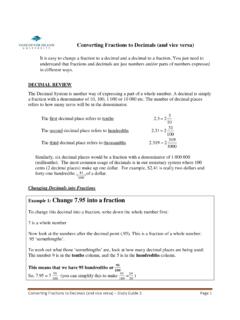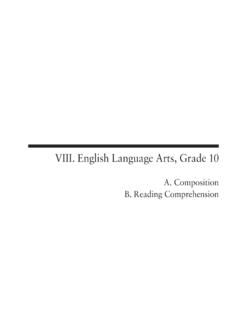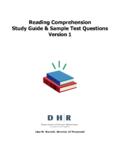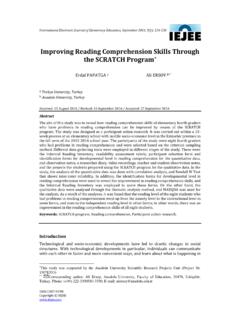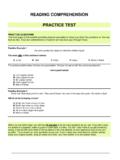Transcription of VIU Reading Comprehension Study Guide and Practice Test
1 Reading Comprehension Study Guide and Practice Test 2015 Page 1 Reading Comprehension Study Guide Reading is one of the most important skills for any student in any program. Students are required to read a variety of different texts and Reading materials from novels to blue prints, labels to poetry (depending on your program!) It isn t just a matter of Reading words. Students need to be able to make sense of what they read, make inferences, communicate the information clearly to others, and more. You can improve your Reading skills by Reading as much and as widely as possible; read newspapers, magazines, adverts, stories, poetry, song yourself by learning new vocabulary or by Reading something then repeating back (without looking) what you have just read.
2 1. Tips to get started: Look over the whole piece of writing. Notice its title. Notice its length. Read the first line of each paragraph to get an idea of how the writer has organized the piece. Read the first line of the last paragraph to get an idea of how it may finish. 2. Read with concentration. Concentrate on the words AND the meaning of groups of words. If there are vocabulary words that are unknown to you, read the sentence and try to understand what is meant by the sentence, so that you can guess at the meaning of the word. When concentrating is challenging, try these strategies: Read the questions before you read the piece. It may help to know what you are looking for! Read out loud.
3 Your own voice can sometimes focus your mind AND eliminate outside distractions. Discuss the meaning as if you were telling someone else what you think it means. Sometimes having to express your thoughts can clarify them. 3. Practice specific Reading skills: Recalling details/facts/information Understanding main ideas Making inferences Reading Comprehension Study Guide and Practice Test 2015 Page 2 Reading Skill: Recalling Details, Facts, and Information Start by quickly scanning the text. Look at titles, sub-titles, pictures etc. This prepares your brain to receive the information When doing multiple choice quizzes, read the questions first before Reading the text then you ll know what information you are looking for Try to get interested in the details (readers recall what they are interested in) Decide what is most important and what is probably not worth remembering (you can t remember everything) Reread if you need to Go back and reread after you have read the question Reading Skill: Understanding Main Ideas The main idea: is the most important idea in the passage.
4 Can be found at the beginning, in the middle or at the end of the passage. may be stated clearly or it may be implied. is supported by all the sentences in the passage. Sample Question: If you, like most people, have trouble recalling the names of those people you have just met, try this. The next time you are introduced, plan to remember the names. Say to yourself, I ll listen carefully; I ll repeat each person s name to be sure I ve got it, and I will remember. You ll discover how effective the technique is and probably recall those names for the rest of your life. The main idea of this passage maintains that memory A. always operates at peak efficiency B. breaks down early in the day C.
5 Improves if new information is used immediately D. becomes unreliable when a person is tired Answers: 1. C Supports are discover how effective ; probably recall those names for the rest .. Reading Skill: Making Inferences Sometimes when you are Reading you must go beyond the printed word on the page, to what is hinted at or likely to be true, given the set of facts. Inferences can only be made when there are facts to back them. Example: The old man staggered along the sidewalk, his torn, grey coat flapping in the wind. Reading Comprehension Study Guide and Practice Test 2015 Page 3 You might infer that the man is drunk, but really the facts don t substantiate that inference. That would be a guess. It could be that the man has been mugged, that he is sick, or that he has had a medical crisis such as a heart attack.
6 All of these could be the case, or some other explanation may be possible. Unless the facts support the inference, it could be incorrect. You can make accurate inferences when you: think about all the ideas that are presented. think about the suggested or implied meaning of the words used. ensure they are supported by facts. The following words in a Reading may suggest you need to make an inference: implies that .. infers that .. might be described indicates that .. seems to be .. can assume that .. suggests .. probably .. can conclude that .. Reading Comprehension Study Guide and Practice Test 2015 Page 4 Reading Comprehension Practice Assessment Directions: Circle the correct answer (answers are at the end of the assessment) Part A: Reading Skill: Recalling Details, Facts, and Information 1.
7 An adult drinks from one and one half to five, or more, quarts of water a day. Total daily intake depends on climate, workload, body size, and many other factors. One of the factors that determines the amount of water an adult drinks per day is A. state of health B. body size C. age D. gender 2. Most of us think that the water we drink is safe. It usually is, but some of us are using poorly treated drinking water which has been spoiled by bacteria, toxic chemicals, metal, and a possible wide range of other pollutants. Most of the time our drinking water is A. contaminated by bacteria B. contaminated by metals C. undrinkable D. safe to drink 3. At least 4,000 cases of water-borne illnesses occur each year in the The actual total may be ten times greater.
8 Further, medical science has not yet determined the effects on people of long-term exposure to contaminated drinking water. Medical science does not know A. how to protect people from contaminated drinking water B. why some drinking water is improperly treated C. the long-term effects of unsafe drinking water on people D. how much water is required for the average person Read the following and answer the questions: There are several things that every defensive driver should learn. To begin with, the defensive driver should learn to drive courteously. That is, he should always let the other person have the right-of-way if there is any doubt. Also, the defensive driver should learn to anticipate, or guess, what the other driver is going to do next.
9 This gives him time to get his car into a safer position, if necessary. Furthermore, every defensive driver should learn to give the proper signal before changing directions, allowing enough time for other drivers to react to it. Lastly, every defensive driver should learn to keep a safe distance between his car and the car ahead. Reading Comprehension Study Guide and Practice Test 2015 Page 5 4. A defensive driver is A. courteous B. an aggressive driver C. a slow driver D. a night driver 5. The motto of the defensive driver should be: a. If you drink, don t drive. b. A safe driver is a relaxed driver. c. Safe driving does not just happen; you have to work at it. d. When in doubt, give the other person the right-of-way.
10 6. A defensive driver a. should learn to anticipate the actions of others b. should maintain a steady speed at all times c. never stops to pick up hitchhikers d. always checks the tires for air pressure Part B: Reading Skill: Understanding Main Ideas Read the following and answer the questions: It seems that everyone you meet these days knows something about astrology. Go to a party nowadays and chances are that the first stranger you meet will ask you, What s your sign? This question comes even before, What is your name? The stranger means, of course, What sign of the zodiac are you born under? You would answer Virgo or Pisces or whatever your sign is. But astrology is nothing new. It has been around for thousands of years.



